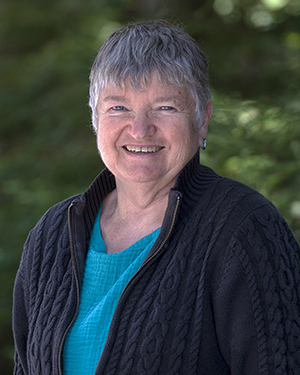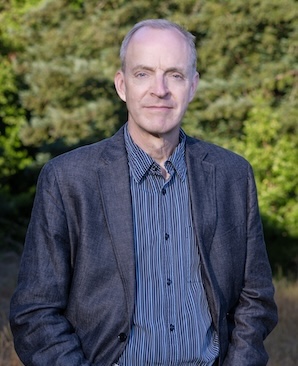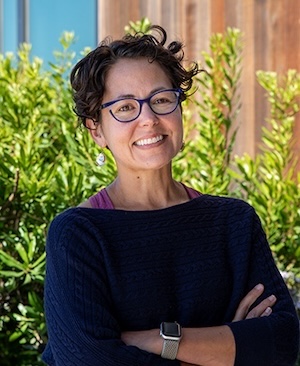Campus News
Three UC Santa Cruz faculty members named 2023 AAAS fellows
Three UC Santa Cruz faculty members have been named 2023 fellows of the American Association for the Advancement of Science: Diane Gifford-Gonzalez, emerita distinguished research professor of anthropology; longtime journalist Robert Irion, emeritus director of UC Santa Cruz’s science communication master’s degree program; and acclaimed paleo-geneticist Beth Shapiro, professor of ecology and evolutionary biology.

Distinguished Professor Emerita Diane Gifford-Gonzalez. (Nick Gonzales/UC Santa Cruz)


Three UC Santa Cruz faculty members have been named 2023 fellows of the American Association for the Advancement of Science (AAAS), one of the world’s largest general scientific societies and publisher of the Science family of journals.
They are Diane Gifford-Gonzalez, emerita distinguished research professor of anthropology; longtime journalist Robert Irion, emeritus director of UC Santa Cruz’s science communication master’s degree program; and acclaimed paleo-geneticist Beth Shapiro, professor of ecology and evolutionary biology. They are among 502 scientists, engineers and innovators awarded today with the lifetime honor.
Gifford‑Gonzalez was recognized for “distinguished contributions to the field of anthropological archaeology, particularly zooarchaeology as it relates to the origins and spread of pastoralism, and for professional leadership and undergraduate student mentoring.”
Gifford-Gonzalez joined UC Santa Cruz in 1976 and pioneered using animal remains to gain new insights into the deep history of humans and animals. Over her career, she has researched the domestication of animals and emergence of herding societies in Africa, as well as indigenous foodways and land management in the Monterey Bay region.
Gifford-Gonzalez has served as president of the Society for American Archaeology (SAA) and in other leadership appointments in professional organizations. In 2011, she helped to create an SAA scholarship program to support recruiting historically underrepresented students into the field, receiving an SAA President’s Recognition Award for those efforts. She has received teaching awards from the UC Santa Cruz Alumni Association and the Academic Senate Committee on Teaching. She retired from UC Santa Cruz in 2015 but still welcomes undergraduate interns into her lab.
AAAS recognized Irion for “distinguished contributions to the development of professional science writers, both in the academic setting and through professional societies, and for excellence in popular communication of astronomy.” He began teaching in UC Santa Cruz’s Science Communication Program in 2000 and directed the program from 2006 to 2016. He currently serves as program advisor and senior lecturer. He was a U.S. correspondent in astronomy and astrophysics for Science, and has written for National Geographic, Smithsonian, Scientific American, Discover, New Scientist, and many other publications.
Irion has won three national writing awards in the physical sciences, including one from the American Institute of Physics for his co-authored book, One Universe: At Home in the Cosmos, with Neil deGrasse Tyson and Charles Liu. He served as co-chair of the National Association of Science Writers Education Committee for six years, leading to the Diane McGurgan Service Award. He was a longtime board member of the Northern California Science Writers Association and continues to serve as a mentor for science-writing students nationally.
Irion earned a bachelor’s degree in earth and planetary sciences from MIT and worked as a newspaper reporter in Boston before graduating from the Science Communication Program in 1988. He served as the campus’s first full-time science writer in the Public Information Office from 1989 to 1997.
Shapiro was recognized for “distinguished contributions towards the understanding of how species and populations evolve, and for the ability to communicate science to the public.” A professor of ecology and evolutionary biology and a leader in the field of paleogenomics and ancient DNA, Shapiro uses genetic material recovered from the remains of plants and animals that lived long ago to study evolution and explore how species and ecosystems have changed over time.
She was a Howard Hughes Medical Institute (HHMI) investigator and HHMI professor, and is currently on leave from UC Santa Cruz through the 2024-25 academic year while serving as Chief Science Officer for the startup company Colossal. Her Paleogenomics Lab at UC Santa Cruz will continue to be led by her co-principal investigator Ed Green, professor of biomolecular engineering.
A 2009 MacArthur Fellow, Shapiro is an award-winning popular science author and communicator who uses her research as a platform to explore the potential of new genomic technologies for conservation and medicine. Her most recent book, Life as We Made It, explores the genetic modification of living things in the context of history, archeology, paleontology, and genomics.
“This year’s class embodies scientific excellence, fosters trust in science throughout the communities they serve, and leads the next generation of scientists while advancing scientific achievements,” AAAS Chief Executive Officer Sudip Parikh, said in a statement.
The new fellows will be honored at the 150th anniversary celebration of AAAS on September 21 at the National Building Museum in Washington, D.C. View the full list of 2023 fellows.